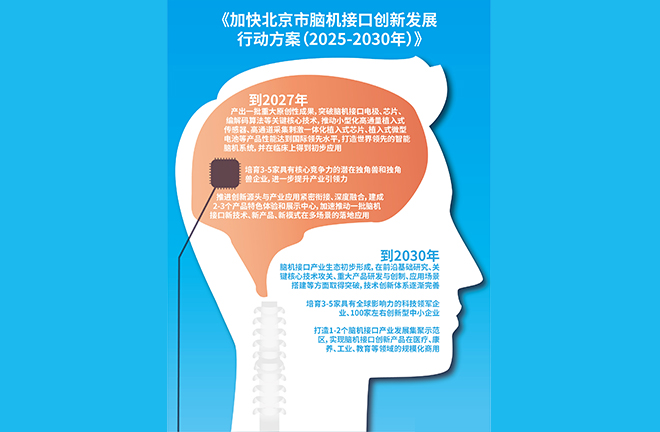Protect right to mental integrity in use of BCI technology

The “Action Plan for Accelerating the Innovation and Development of Brain-Computer Interfaces in Beijing (2025-2030)” was issued on Jan. 8, 2025. Photo: IC PHOTO
While brain-computer interface (BCI) technology holds immense potential for application, “intimate” interaction between machines and the human brain poses various risks both directly and indirectly. Research ethics and legal guidelines should be established and observed to prevent the misuse and abuse of BCI technology, which could raise societal concerns and fears.
Risks
BCI technology offers infinite possibilities for accessing, collecting, interpreting, and influencing brain activity while also posing unprecedented threats to mental and personal freedom.
Invasion of brain privacy: BCI devices can record brain signals in real time over extended periods without an individual’s knowledge. By identifying and decoding these signals, researchers can extract physiological and psychological information, making a person’s attention, consciousness, emotions, and intentions “visible.”
Erosion of autonomy: Informed consent embodies the respect for autonomy in practice. However, patients undergoing BCI treatments often lack the capacity for informed consent due to cognitive impairment, creating a dilemma in which others must make decisions on their behalf. Even when individuals possess independent decision-making capacity, BCIs can still threaten their autonomy. Addiction to BCI technology may progressively weaken users’ self-determination, while malicious attacks on BCI systems could selectively erase memories or implant false ones. More alarmingly, individuals whose brains are maliciously manipulated may be entirely unaware of their loss of autonomy.
Destabilization of personal identity: The brain is the biological foundation of self-awareness, self-image, and personality. While BCIs can aid in treating psychological and psychiatric disorders, they also have the potential to compromise the authenticity of self-expression. Do post-intervention personality changes leave patients feeling estranged from themselves? Or do these changes actually align with the patient’s “true self”? Self-perception relies on a sense of temporal continuity, and when individuals feel disconnected from their prior sense of self, it can lead to profound feelings of estrangement.
Rights
The development and application of BCI technology may involve multiple human rights.
Right to bodily integrity and health: These rights protect an individual’s physical and mental well-being. Invasive BCIs, which often require surgical procedures, directly impact bodily integrity. For non-invasive BCIs, however, it is not possible to provide protection solely based on the right to bodily integrity or the right to health.
Right to privacy: Under the current legal system, BCI technology raises the question of whether traditional privacy rights encompass neural data and mental privacy. Advocates of the “right to mental privacy” argue that existing privacy and data protection laws are inadequate for BCI scenarios. Establishing the right to mental privacy would protect personal brain information recorded by neural devices and shared within the digital ecosystem. This right should apply to both conscious brain data and data that is either partially or entirely beyond conscious control.
Cognitive freedom and mental self-determination: BCI interventions can affect individual decision-making and behavior to varying degrees. We should therefore focus on the negative formulation of the right to cognitive freedom, namely the right to reject coercive use of BCIs and other neurotechnologies.
Mental integrity: Malicious attacks on BCI devices threaten not only users’ mental privacy and brain data but also their mental integrity.
Establishing the right to mental integrity would offer more comprehensive protection against the harms associated with advanced neurotechnologies such as BCI. Essentially, this right prevents unauthorized brain interventions and grants the right to terminate such interventions at any time once they are initiated. Violations of the right to mental integrity primarily fall into two categories: first, illegal access to or monitoring of the brain, including unauthorized processing of EEG signals or neural data; second, illegal manipulation of the mind, such as unauthorized alteration of thoughts and emotions through neural modulation or stimulation, or altering certain brain functions to induce involuntary behavior.
To safeguard citizens’ right to mental integrity, the use of BCIs, whether invasive or non-invasive, for medical or enhancement purposes, must be subject to informed consent. Coercive or deceptive use must be prohibited. But like all rights, the right to mental integrity has its limits. The state’s use of BCI technology to infringe upon citizens’ mental integrity must be justified by a significant and compelling public interest. The burden of proof lies with the state, and stringent evidentiary standards must be met.
Li Xiaoyong is a professor from the School of Medical Humanities at Capital Medical University.
Edited by WANG YOURAN
